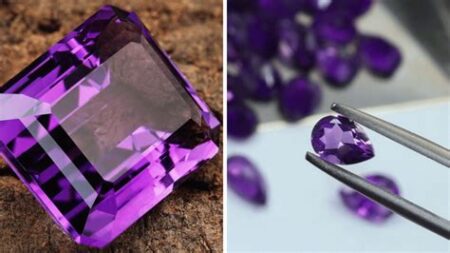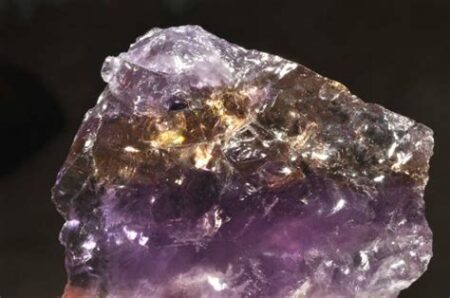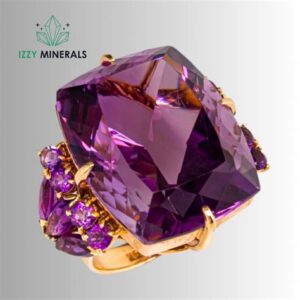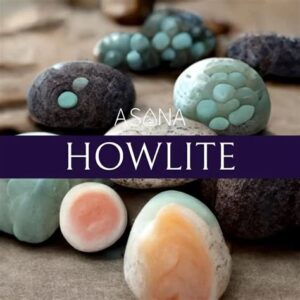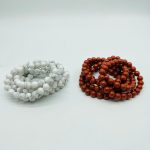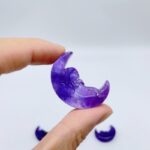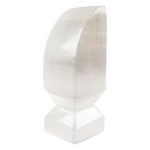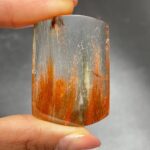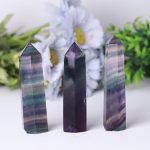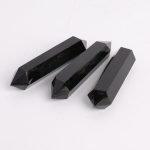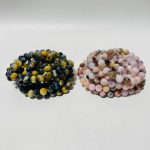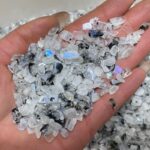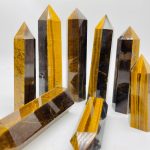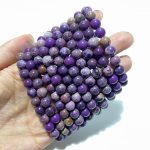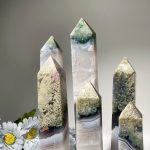Deep within the rugged mountains of Argentina, lies a hidden treasure—rhodochrosite, a captivating gemstone renowned for its exquisite pink hues and intricate patterns. Argentina proudly holds the distinction of being the world’s primary source of this extraordinary mineral, making it a prized possession sought after by collectors and enthusiasts alike.

Rhodochrosite: A Geological Marvel
Rhodochrosite is a manganese carbonate mineral with a unique chemical composition (MnCO3). Its rosy coloration stems from the presence of manganese, which lends the gemstone its characteristic pink to red shades. The formation of rhodochrosite is a complex geological process involving the precipitation of manganese-rich fluids within hydrothermal veins. These veins are commonly found within limestone and sedimentary formations.
Argentina’s Rhodochrosite Deposits: A Global Gemstone Hub
Argentina is unequivocally the world’s leading producer of rhodochrosite, accounting for an estimated 80% of the global supply. The renowned Capillitas Mine in Catamarca province is the largest known rhodochrosite deposit. This mine has yielded some of the world’s most spectacular specimens, including massive slabs and intricately patterned stalactites.
The Capillitas Mine operates at altitudes ranging from 3,000 to 4,000 meters (9,800 to 13,000 feet), posing unique challenges for mining operations. Utilizing advanced technology and skilled craftsmanship, miners carefully extract the rhodochrosite from the host rock, preserving its natural beauty.
Physical Characteristics and Value
Rhodochrosite exhibits a vitreous to pearly luster, adding to its captivating appearance. Its Mohs hardness rating of 3.5 to 4.5 indicates that it is relatively soft and requires careful handling to avoid damage. The gemstone’s opaque to translucent nature allows for the creation of vibrant cabochons and beads, highlighting its exceptional color.
The rarity and captivating beauty of rhodochrosite have significantly enhanced its value in the gemstone market. Intact specimens with intense pink hues and intricate patterns command premium prices. The size, clarity, and overall quality of the stone heavily influence its worth.
Understanding the Appeal of Rhodochrosite
Rhodochrosite holds a special allure among gemstone enthusiasts for several reasons:
- Captivating Color: The gemstone’s vibrant pink hues evoke a sense of joy, warmth, and femininity, making it a popular choice for jewelry.
- Unique Patterns: Rhodochrosite often exhibits stunning patterns, such as banding, veining, and swirling, which enhance its visual appeal.
- Historical Significance: Rhodochrosite has been prized since ancient times by indigenous cultures in Argentina, where it was believed to possess healing properties.
- Versatility: Rhodochrosite’s versatility allows it to be incorporated into various jewelry designs, from delicate earrings to statement necklaces.
Beyond Jewelry: Unlocking Rhodochrosite’s Potential
While predominantly known for its use in jewelry, rhodochrosite’s exceptional properties offer promising applications in other industries. Its unique color and optical characteristics make it a compelling material for:
- Interior Design: Rhodochrosite’s vibrant hues and intricate patterns can transform interior spaces, creating visually stunning accents in furniture, flooring, and decorative objects.
- Art and Sculpture: Artists and sculptors appreciate rhodochrosite’s natural beauty and use it to create captivating sculptures, mosaics, and other artistic expressions.
- Fashion: The gemstone’s vibrant color and unique patterns have inspired fashion designers to incorporate rhodochrosite into clothing, accessories, and footwear, adding a touch of elegance and individuality.
- Metaphysical and Spiritual Practices: Rhodochrosite is believed to possess metaphysical properties that promote emotional healing, self-love, and inner peace. Some practitioners use it for meditation, crystal healing, and spiritual practices.
Environmental Considerations: Mining and Sustainability
The mining of rhodochrosite inevitably impacts the environment, particularly at the Capillitas Mine. To mitigate these impacts, the mine has implemented sustainable practices, including:
- Reclamation and Rehabilitation: The mine actively reclaims and rehabilitates the land disturbed by mining operations, restoring it to its natural state as much as possible.
- Water Conservation and Management: Water scarcity is a significant concern in the region. The mine employs water conservation measures and manages water resources responsibly to minimize its environmental footprint.
- Energy Efficiency and Renewable Energy: The mine strives to reduce its energy consumption and utilize renewable energy sources, such as solar and wind power, to lessen its carbon emissions.
- Community Engagement and Support: The mine fosters positive relationships with local communities, providing employment opportunities and supporting social and economic initiatives to promote sustainable development in the region.
Tips and Tricks for Caring for Rhodochrosite
To preserve the beauty and longevity of rhodochrosite, it is essential to provide proper care:
- Avoid Harsh Chemicals: Use only mild detergents and soft cloths to clean rhodochrosite. Avoid harsh chemicals, such as bleach or ammonia, as they can damage the gemstone’s surface.
- Store Carefully: Store rhodochrosite separately from other gemstones to prevent scratching. Use a soft pouch or fabric-lined jewelry box for safekeeping.
- Protect from Heat and Sunlight: Rhodochrosite is susceptible to fading and discoloration when exposed to excessive heat or sunlight. Store and wear it away from direct sources of heat or prolonged sunlight.
- Consider Protective Settings: When setting rhodochrosite in jewelry, choose protective settings that shield the gemstone from knocks and bumps.
- Seeking Professional Cleaning: If rhodochrosite becomes heavily soiled, consider seeking professional cleaning services to restore its original luster.
Frequently Asked Questions (FAQs)
1. What is the origin of the name ‘rhodochrosite’?
The name ‘rhodochrosite’ is derived from the Greek words ‘rhodon’ (rose) and ‘chroma’ (color), referring to the gemstone’s characteristic pink hue.
2. How can I distinguish rhodochrosite from other pink gemstones?
One distinguishing characteristic of rhodochrosite is its vitreous to pearly luster. Another indicator is its relatively low Mohs hardness (3.5 to 4.5).
3. Is rhodochrosite a durable gemstone?
Rhodochrosite is relatively soft and should be handled with care to avoid damage. It is not suitable for everyday wear in jewelry that may encounter significant wear and tear.
4. What are the benefits of rhodochrosite in jewelry?
Rhodochrosite’s vibrant pink hues and intricate patterns make it a captivating choice for jewelry. It exudes a sense of warmth, femininity, and joy.
5. How can I incorporate rhodochrosite into my home décor?
Rhodochrosite’s unique color and patterns make it a versatile element for home décor. Consider using it as accents in flooring, countertops, or as decorative objects to add visual intrigue to your space.
6. Is rhodochrosite a good investment?
While the value of gemstones can fluctuate, high-quality rhodochrosite with intense pink hues and intricate patterns can retain its value over time. Factors such as size, clarity, and overall quality influence its worth.
7. What ethical considerations should I be aware of when purchasing rhodochrosite?
When purchasing rhodochrosite, inquire about the origin and mining practices to ensure that it is ethically sourced from mines that adhere to sustainable practices and respect local communities.
8. How can I learn more about rhodochrosite?
Visit reputable gemological institutions or consult resources from professional gemological associations to gain in-depth knowledge about rhodochrosite’s properties, history, and applications.
Tables for Reference
Table 1: Rhodochrosite Deposits in Argentina
| Province | Mine | Estimated Reserves |
|---|---|---|
| Catamarca | Capillitas | 80% of global supply |
| Salta | Incahuasi | Significant deposits |
| San Juan | Campamento | Minor deposits |
Table 2: Physical Characteristics of Rhodochrosite
| Property | Value |
|---|---|
| Chemical Formula | MnCO3 |
| Color | Pink to red |
| Luster | Vitreous to pearly |
| Mohs Hardness | 3.5 to 4.5 |
| Crystal Structure | Trigonal |
| Specific Gravity | 3.45 to 3.70 g/cm³ |
Table 3: Rhodochrosite’s Applications
| Industry | Application |
|---|---|
| Jewelry | Cabochons, beads, inlay |
| Art and Sculpture | Sculptures, mosaics, ornaments |
| Fashion | Accessories, clothing, footwear |
| Interior Design | Flooring, countertops, accents |
Table 4: Care and Maintenance of Rhodochrosite
| Care Practice | Recommendation |
|---|---|
| Cleaning | Use mild detergents and soft cloths |
| Storage | Store separately in a soft pouch or fabric-lined box |
| Protection | Choose protective settings in jewelry |
| Environmental Considerations | Store away from heat and sunlight |
| Professional Cleaning | Consider professional cleaning for heavily soiled rhodochrosite |

